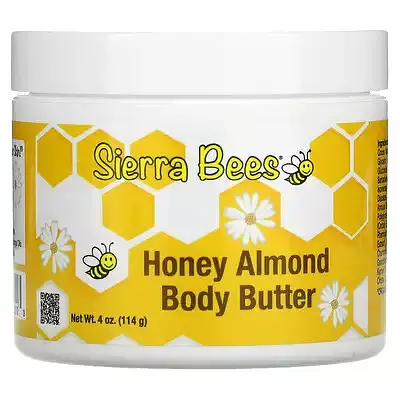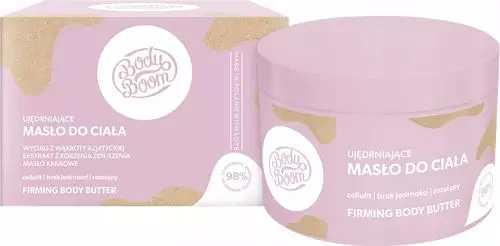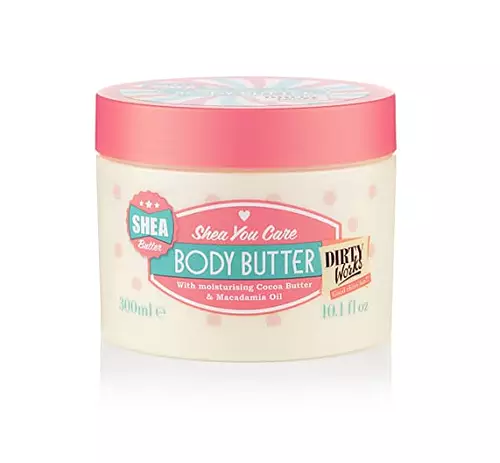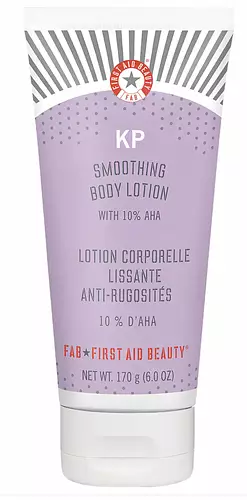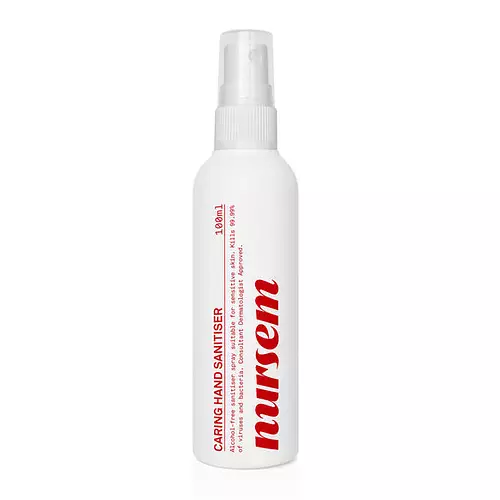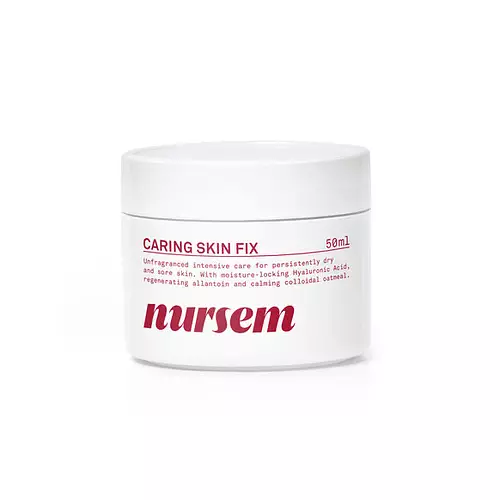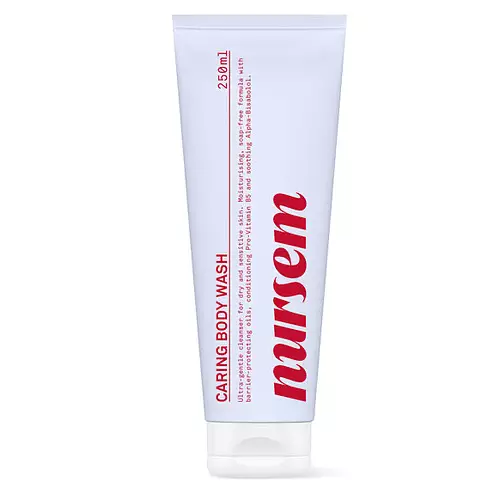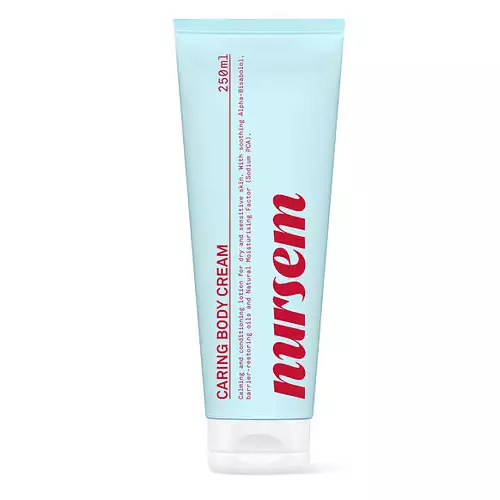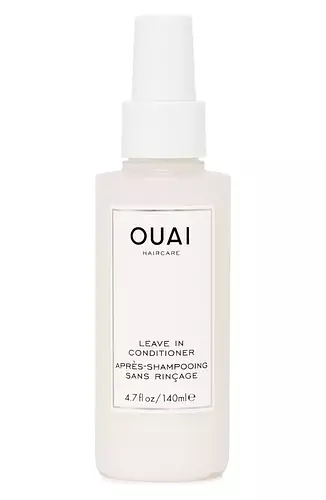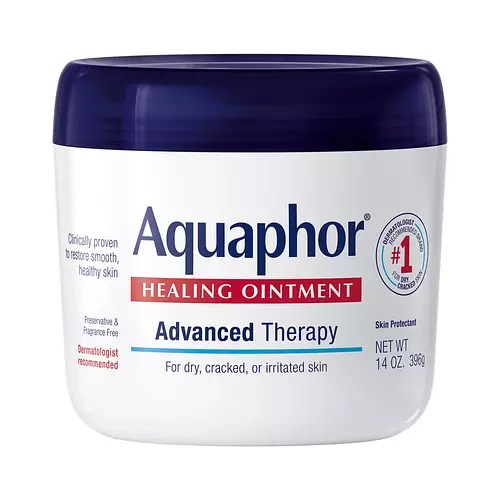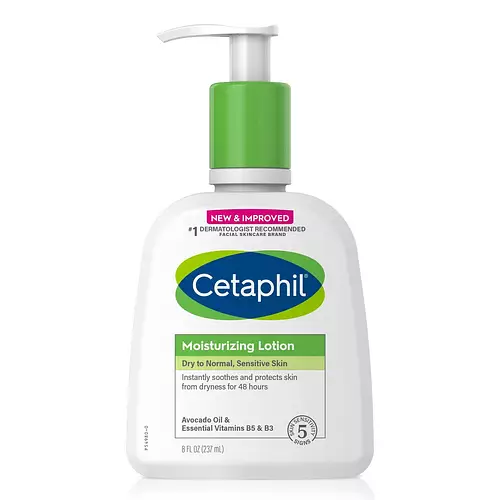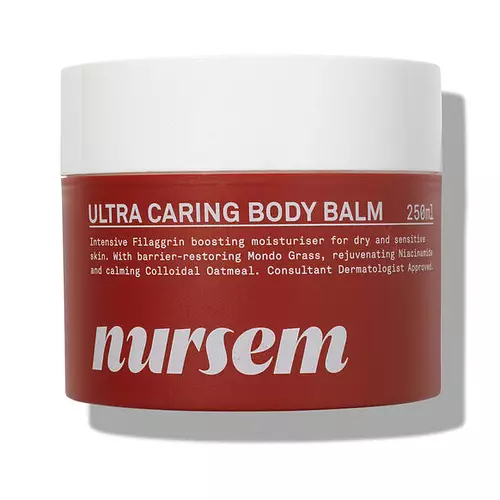
Nursem Ultra Caring Body Balm Ingredients Explained
Published on April 24, 2023 Submitted by Butter
Overview
What it is
Body lotion with 28 ingredients that contains exfoliants, niacinamide and Vitamin E
Cool Features
It is vegan, cruelty-free, and reef safe
Suited For
It has ingredients that are good for fighting acne, dry skin, brightening skin, sensitive skin, oily skin, reducing pores, scar healing and dark spots
Free From
It doesn't contain any harsh alcohols, common allergens, fragrances, oils, parabens, silicones or sulfates
Fun facts
Nursem is from United Kingdom.
We independently verify ingredients and our claims are backed by peer-reviewed research. Does this product need an update? Let us know.
Body lotion with 28 ingredients that contains exfoliants, niacinamide and Vitamin E
Quick info
You should know
Notable Ingredients
This product contains 1 ingredient that may have this attribute:
This product contains 1 ingredient that may have this attribute:
This product contains 1 ingredient that may have this attribute:
Benefits
This product contains 2 ingredients that may have this attribute:
This product contains 1 ingredient that may have this attribute:
This product contains 2 ingredients that may have this attribute:
This product contains 1 ingredient that may have this attribute:
This product contains 1 ingredient that may have this attribute:
This product contains 1 ingredient that may have this attribute:
This product contains 1 ingredient that may have this attribute:
This product contains 3 ingredients that may have this attribute:
Concerns
This product contains 5 ingredients that may have this attribute:
This product contains 3 ingredients that may have this attribute:
Ingredients 28
Water. It's the most common cosmetic ingredient of all. You'll usually see it at the top of ingredient lists, meaning that it makes up the largest part of the product.
Butyrospermum Parkii Butter is a plant lipid from the fruit of the Shea Tree. It is an effective skin hydrator and emollient.
Glycerin is already naturally found in your skin. It helps moisturize and protect your skin.
Theobroma Cacao Seed Butter comes from the Theobroma cacoa, or Cacao tree. Cacao trees are native to tropical landscapes.
Caprylic/Capric Triglyceride is an emollient, solvent, and texture enhancer. It is considered a skin-softener by helping the skin prevent moisture loss.
Oatmeal flour is created by grinding down the kernels of oats. Oatmeal helps sooth, hydrate, and protect the skin.
Myristyl lactate is created from myristyl alcohol and lactic acid.
Niacinamide has emerged as an all-star ingredient due to its many benefits.
Panthenol (also referred to as pro-vitamin B5) is a common ingredient that helps hydrate and soothe the skin.
Cetearyl alcohol is a mixture of two fatty alcohols: cetyl alcohol and stearyl alcohol. It is mainly used as an emulsifier. Emulsifiers help prevent the separation of oils and products. Due to its composition, it can also be used to thicken a product or help create foam.
Allantoin plays a role in soothing and moisturizing the skin. Because of this, it is often added to products with strong active ingredients.
Helianthus Annuus Seed Wax is created from the common sunflower.
Glyceryl Stearate is a mix of glycerin and stearic acid.
Jojoba Esters is a wax created from Jojoba oil. It is an emollient and film-forming ingredient. In bead form, it is an exfoliator.
Stearic Acid is a fatty acid. It is an emollient, emulsifier, and texture enhancer.
Sodium Benzoate is a preservative. It's used in both cosmetic and food products to inhibit the growth of mold and bacteria. It is typically produced synthetically.
Citric Acid is an AHA derived from citrus fruits (think oranges, lemons, and limes!).
Xanthan gum is used as a stabilizer and thickener within cosmetic products. It helps give products a sticky, thick feeling - preventing them from being too runny.
Sodium Stearoyl Glutamate is an emulsifier and helps condition the skin. It is amino acid-based.
Potassium Sorbate is a preservative used to prevent yeast and mold in products. It is commonly found in both cosmetic and food products.
Tetrasodium Glutamate Diacetate is a chelating agent. Chelating agents help prevent metal ions from binding to other ingredients. This helps prevent unwanted effects and reactions from a product. These metal ions may come from water and are found in miniscule amounts.
Maltodextrin is a polysaccharide. It is derived from starch such as rice, corn, wheat, or potato starch.
Tocopheryl Acetate is AKA Vitamin E. It is an antioxidant and protects your skin from free radicals. Free radicals damage the skin by breaking down collagen.
Water, Butyrospermum Parkii Butter, Glycerin, Theobroma Cacao Seed Butter, Caprylic/Capric Triglyceride, Avena Sativa Kernel Flour, Myristyl Lactate, Niacinamide, Panthenol, Cetearyl Alcohol, Allantoin, Triheptanoin, Helianthus Annuus Seed Wax, C17-26 Isoalkane, Glyceryl Stearate, Jojoba Esters, Stearic Acid, Ophiopogon Japonicus Root Extract, Chondrus Crispus, Sodium Benzoate, Citric Acid, Xanthan Gum, Sodium Stearoyl Glutamate, Potassium Sorbate, Tetrasodium Glutamate Diacetate, Maltodextrin, Tocopheryl Acetate, Polyglycerin-3
Ingredient Ratings
Based on the number of likes and dislikes each ingredient has received.
Ingredients Explained
Water. It's the most common cosmetic ingredient of all. You'll usually see it at the top of ingredient lists, meaning that it makes up the largest part of the product.
So why is it so popular? Water most often acts as a solvent - this means that it helps dissolve other ingredients into the formulation.
You'll also recognize water as that liquid we all need to stay alive. Talk about multi-purpose! If you see this, drink a glass of water. Stay hydrated!
Learn more about WaterButyrospermum Parkii Butter is a plant lipid from the fruit of the Shea Tree. It is an effective skin hydrator and emollient.
Emollients help soothe and soften your skin. It does this by creating a protective film on your skin. This barrier helps trap moisture and keeps your skin hydrated. Emollients may be effective at treating dry or itchy skin.
Shea butter is rich in antioxidants. Antioxidants help fight free-radicals, or molecules that may harm the body. It is also full of fatty acids including stearic acid and linoleic acid. These acids help replenish the skin and keep skin moisturized.
While Shea Butter has an SPF rating of about 3-4, it is not a sunscreen replacement.
Shea butter may not be fungal acne safe. We recommend speaking with a professional if you have any concerns.
Learn more about Butyrospermum Parkii ButterGlycerin is already naturally found in your skin. It helps moisturize and protect your skin.
A study from 2016 found glycerin to be more effective as a humectant than AHAs and hyaluronic acid.
As a humectant, it helps the skin stay hydrated by pulling moisture to your skin. The low molecular weight of glycerin allows it to pull moisture into the deeper layers of your skin.
Hydrated skin improves your skin barrier; Your skin barrier helps protect against irritants and bacteria.
Glycerin has also been found to have antimicrobial and antiviral properties. Due to these properties, glycerin is often used in wound and burn treatments.
In cosmetics, glycerin is usually derived from plants such as soybean or palm. However, it can also be sourced from animals, such as tallow or animal fat.
This ingredient is organic, colorless, odorless, and non-toxic.
Glycerin is the name for this ingredient in American English. British English uses Glycerol/Glycerine.
Learn more about GlycerinTheobroma Cacao Seed Butter comes from the Theobroma cacoa, or Cacao tree. Cacao trees are native to tropical landscapes.
Like other plant butters, Cacao seed butter is an emollient. Emollients help soothe and soften your skin. By creating a barrier to trap moisture in, emollients help keep your skin hydrated.
Cacao seed butter contains antioxidants known as polyphenols. Antioxidants help fight free-radical molecules by stabilizing them. Unstable free-radicals may cause damage to your skin cells. Antioxidants may help with anti-aging.
Theobroma Cacao Seed Butter can be bad for acne prone skin.
Learn more about Theobroma Cacao Seed ButterCaprylic/Capric Triglyceride is an emollient, solvent, and texture enhancer. It is considered a skin-softener by helping the skin prevent moisture loss.
Within a product, Caprylic Triglyceride can thicken the product and make spreadability easier by dissolving clumping compounds. An added benefit of Caprylic Triglyceride is its antioxidant properties.
Caprylic Triglyceride is made by combining glycerin with coconut oil, forming a clear liquid. Caprylic Triglyceride has not been found to be toxic for human use in concentrations under 50%.
While there is an assumption Caprylic Triglyceride can clog pores due to it being derived from coconut oil, there is no research supporting this.
Learn more about Caprylic/Capric TriglycerideOatmeal flour is created by grinding down the kernels of oats. Oatmeal helps sooth, hydrate, and protect the skin.
Learn all about the skin benefits of colloidal oatmeal here.
Myristyl lactate is created from myristyl alcohol and lactic acid.
It is an emollient and keeps the skin hydrated by trapping moisture. However, this may worsen oily skin and cause breakouts.
Niacinamide has emerged as an all-star ingredient due to its many benefits.
It is known to treat acne by reducing inflammation. It also helps fade dark-spots and strengthen the skin by promoting the growth of the ceramide barrier.
Other benefits include smoothing wrinkles and minimizing redness.
The cherry on top? Niacinamide can also help build keratin, a protein that keeps skin firm.
When incorporating niacinamide into your routine, look out for concentration amounts. Typically, 5% niacinamide provides benefits such as fading dark spots. However, if you have sensitive skin, it is better to begin with a smaller concentration.
Niacinamide can be mixed with other ingredients to boost benefits. For instance, it has shown to be effective when used with copper, folic acid, and zinc to treat acne.
Learn more about NiacinamidePanthenol (also referred to as pro-vitamin B5) is a common ingredient that helps hydrate and soothe the skin.
lt is a humectant, meaning that it helps the skin attract and retain moisture.
Another benefit is the anti-inflammatory abilities. This means that it's great for sensitive, irritation-prone skin.
Once oxidized, panthenol converts to pantothenic acid. Panthothenic acid is found in all living cells.
Learn more about PanthenolCetearyl alcohol is a mixture of two fatty alcohols: cetyl alcohol and stearyl alcohol. It is mainly used as an emulsifier. Emulsifiers help prevent the separation of oils and products. Due to its composition, it can also be used to thicken a product or help create foam.
Cetearyl alcohol is an emollient. Emollients help soothe and hydrate the skin by trapping moisture.
Studies show Cetearyl alcohol is non-toxic and non-irritating. The FDA allows products labeled "alcohol-free" to have fatty alcohols.
This ingredient is usually derived from plant oils such as palm, vegetable, or coconut oils. There is debate on whether this ingredient will cause acne.
Due to the fatty acid base, this ingredient may not be Malassezia folliculitis safe.
Learn more about Cetearyl AlcoholAllantoin plays a role in soothing and moisturizing the skin. Because of this, it is often added to products with strong active ingredients.
Some studies have shown this ingredient can promote wound healing with higher concentrations.
Allantoin is derived from the comfrey plant but produced synthetically for cosmetic products to ensure purity.
Learn more about AllantoinWe don't have a description for Triheptanoin.
Helianthus Annuus Seed Wax is created from the common sunflower.
Sunflower seed wax is made up of long chain non-glyceride esters, a small amount of fatty alcohols, and fatty acids.
This ingredient is often used to enhance the texture of products. The fatty acid properties also help hydrate the skin.
Learn more about Helianthus Annuus Seed WaxWe don't have a description for C17-26 Isoalkane.
Glyceryl Stearate is a mix of glycerin and stearic acid.
Glyceryl Stearate is used to stabilize the mixing of water and oil ingredients. By preventing these ingredients from separating, it can help elongate shelf life. It can also help thicken the product's texture.
As an emollient, it helps soften skin and supports barrier-replenishing ingredients.
In cosmetics, Glyceryl Stearate is often made from vegetable oils or synthetically produced. The human body also creates Glyceryl Stearate naturally.
Learn more about Glyceryl StearateJojoba Esters is a wax created from Jojoba oil. It is an emollient and film-forming ingredient. In bead form, it is an exfoliator.
This ingredient has high oxidative stability, meaning it doesn't break down when exposed to oxygen.
Its similarity to our skin's natural oils makes it a great emollient. Emollients help soften and soothe our skin by creating a barrier on top. This barrier helps trap moisture in, keeping skin hydrated.
It is created using either the hydrogenation or transesterification processes on jojoba oil.
Learn more about Jojoba EstersStearic Acid is a fatty acid. It is an emollient, emulsifier, and texture enhancer.
As an emollient, stearic acid helps soften skin. It aids the skin's protective barrier by preventing water loss. It also provides a gentle cleansing effect without stripping away natural oils.
Stearic acid may also be used to enhance the texture of products. It can add volume and stabilize ingredients such as water and oil. This can help water and oil ingredients from separating.
Sources of stearic acid include animal or vegetable fats/oils such as coconut or shea. It can be naturally found in butter, cocoa butter, shea butter, vegetable fats, and animal tallow.
This ingredient may not be Malassezia folliculitis, or fungal-acne safe.
Learn more about Stearic AcidWe don't have a description for Ophiopogon Japonicus Root Extract.
Chondrus Crispus is a red algae native to the northern Atlantic ocean.
It is rich in antioxidants. The polysaccharides, peptides, and amino acid content helps moisturize skin.
Antioxidants present in chondrus crispus include lutein and zeaxanthin. Lutein has the ability to filter blue light from screens.
Learn more about Chondrus CrispusSodium Benzoate is a preservative. It's used in both cosmetic and food products to inhibit the growth of mold and bacteria. It is typically produced synthetically.
Both the US FDA and EU Health Committee have approved the use of sodium benzoate. In the US, levels of 0.1% (of the total product) are allowed.
Sodium benzoate works as a preservative by inhibiting the growth of bacteria inside of cells. It prevents the cell from fermenting a type of sugar using an enzyme called phosphofructokinase.
Sodium Benzoate is the salt of benzoic acid. Foods containing sodium benzoate include soda, salad dressings, condiments, fruit juices, wines, and snack foods.
Studies for using ascorbic acid and sodium benzoate in cosmetics are lacking, especially in skincare routines with multiple steps.
We always recommend speaking with a professional, such as a dermatologist, if you have any concerns.
Learn more about Sodium BenzoateCitric Acid is an AHA derived from citrus fruits (think oranges, lemons, and limes!).
If you spot Citric Acid near the end of an ingredient list, it's likely there as a pH adjuster rather than an active ingredient.
As an AHA, Citric Acid removes the top layer of skin cells from the newer layer of skin underneath. This helps skin to remove dark spots and look more even.
Read more about some other popular AHA's here:
Learn more about Citric AcidXanthan gum is used as a stabilizer and thickener within cosmetic products. It helps give products a sticky, thick feeling - preventing them from being too runny.
On the technical side of things, xanthan gum is a polysaccharide - a combination consisting of multiple sugar molecules bonded together.
Xanthan gum is a pretty common and great ingredient. It is a natural, non-toxic, non-irritating ingredient that is also commonly used in food products.
Learn more about Xanthan GumSodium Stearoyl Glutamate is an emulsifier and helps condition the skin. It is amino acid-based.
In higher amounts, it may act as a cleansing agent.
Potassium Sorbate is a preservative used to prevent yeast and mold in products. It is commonly found in both cosmetic and food products.
Potassium sorbate is potassium salt derived from sorbic acid. Sorbic acid is a natural antibiotic and effective against fungus.
Potassium sorbate and sorbic acid can be found in baked goods, cheeses, dried meats, dried fruit, ice cream, pickles, wine, yogurt, and more.
Potassium sorbate is often used with stronger preservatives.
Learn more about Potassium SorbateTetrasodium Glutamate Diacetate is a chelating agent. Chelating agents help prevent metal ions from binding to other ingredients. This helps prevent unwanted effects and reactions from a product. These metal ions may come from water and are found in miniscule amounts.
Tetrasodium Glutamate Diacetate can also help other preservatives be more effective.
Maltodextrin is a polysaccharide. It is derived from starch such as rice, corn, wheat, or potato starch.
In food, Maltodextrin is used to improve the texture and thicken a product. Due to its structure, it can help create a gel texture. As an emulsion stabilizer, it helps keep the ingredients in a product together.
As a polysaccharide, Maltodextrin has moisturizing properties. Polysaccharides are a type of carbohydrate. The top layer of skin uses polysaccharides to retain water, keeping the skin hydrated.
Maltodextrin is water soluble and has a sweet taste.
Learn more about MaltodextrinTocopheryl Acetate is AKA Vitamin E. It is an antioxidant and protects your skin from free radicals. Free radicals damage the skin by breaking down collagen.
One study found using Tocopheryl Acetate with Vitamin C decreased the number of sunburned cells.
Tocopheryl Acetate is commonly found in both skincare and dietary supplements.
Learn more about Tocopheryl AcetatePolyglycerin-3 is a 3-unit glycerin polymer.
Like glycerin, this ingredient is a humectant. Humectants help hydrate your skin by drawing water to it.
Having moisturized skin helps improve the skin barrier. Your skin barrier helps protect against irritants and bacteria.
Learn more about Polyglycerin-3When to use
How this product is used by our community
Directions
Apply daily and massage gently onto skin until fully absorbed.
Apply daily and massage gently onto skin until fully absorbed.
Compared With
Here are some products that it's often compared with
More Nursem Products
See all Nursem productsMore Body Lotions
See all body lotionsWe're dedicated to providing you with the most up-to-date and science-backed ingredient info out there.
The data we've presented on this page has been verified by a member of the SkinSort Team.
Read more about us

